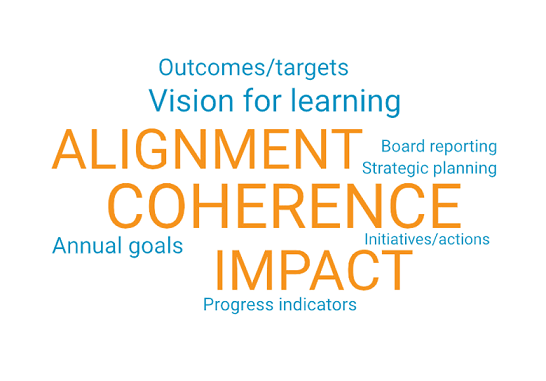Leading with purpose: aligning leadership practices for improved student outcomes
By Carolyn Marino on May 20, 2023 in Leadership
As a principal advisor, Carolyn shares her insights on how principals find coherence and alignment at their work to ensure that ākonga learning and well-being remain the central focus.
How do I know what I am doing is working and making a difference in my students’ learning? What is the evidence for what worked and didn’t work in my teaching?
Questions like these made my heart sing when as a principal, I worked alongside teachers who, when confronted with the possibility that something was not working the way they assumed it would, would stop and ask WHY? This would (hopefully) set off a cycle of reflection and inquiry, motivating further questions:
What am I doing? What impact is it having? Is this what I want? What might I change and try differently? How will I know I'm making a positive difference to my student’s learning?
As a principal advisor, I now work alongside many beginning principals who face a multitude of challenges in their new roles, balancing the demands of leadership and management. Our primary task as advisors is to support our leaders in keeping a focus on improving student achievement at the forefront of all their decision-making processes.
In practice, this is easier said than done. The sheer volume of tasks and issues that beginning principals face can often lead to important, non-urgent work being overshadowed by important urgent tasks. However, as advisors, we help principals find coherence and alignment in the different aspects of their work to ensure that student learning and well-being remain the core focus.
Our schools have vision and value statements, strategic goals, and annual plans that guide the principal’s work. There are also obligations to report to the board and whanau on the impact of the work and initiatives on student learning outcomes. Often, these important tasks are tackled as isolated workstreams in the daily life of a busy principal. However, through careful listening and inquiry, we are able to support principals to think and act more systemically. Questions that support this inquiry include:
What does the data tell you about your school’s current strengths?
How might you utilise the teacher expertise you have observed in your recent class visits to share this effective practice across your school?
Help me understand your reasoning behind choosing this particular PLD initiative. What did you notice that led you to this programme/initiative? How will you know it is having the desired effect you want? What will success look like here?
What is compelling for you from this data analysis that you need to focus on improving this year?
Talk me through where (data, information) has influenced this particular choice of initiatives in your annual plan. What changes are you hoping to see? How will you regularly measure the impact of these initiatives/actions on the outcomes you are looking for?
How do you share the progress/impact of your annual plan actions with the Board?
By highlighting where different pieces of work connect, we can support principals to see coherence in their different work streams: moving from evidence-driven decision-making to choosing appropriate PLD initiatives to trial and, importantly, measuring the impact of these initiatives and actions on the outcomes they desire.

In conclusion, as leaders, we must constantly reflect on and evaluate the impact of our leadership practices on student learning and well-being. Aligning and integrating the different aspects of leadership work ensures that initiatives and actions have the desired effect on student outcomes. Let’s keep the central focus on our learners and continue to make a positive difference in their learning and well-being.
To learn more get in touch with Carolyn today
Other articles you might like
Communication sits at the heart of every effective leadership team. This belief is truer today, in the midst of the COVID -19 pandemic, than it has ever been. Now more than ever, leadership teams need to deliberately act in ways that ensure communication remains effective. It can’t be left to chance. This blog highlights some important areas that a leader and leadership team should pay attention to as they continue to lead through uncertain times.
The role of school principals continues to evolve, with increasing opportunities to lead in innovative and collaborative ways.
Evaluation Associates is providing specific support for established principals as part of the Principal Advisors contract with the Ministry of Education. We’ve spoken with three principals who have been supported by our team. Their stories below reflect the ways in which we can walk alongside established principals.
